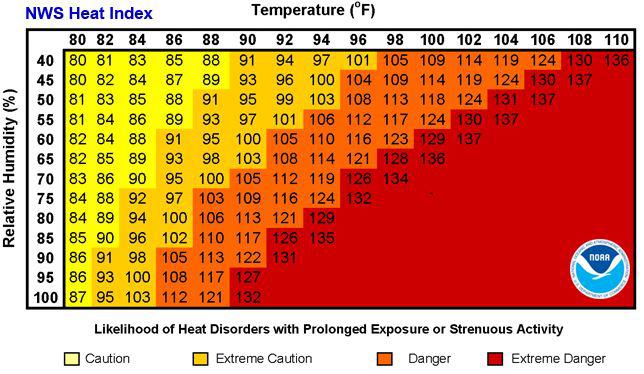The Heat Index: How It's Calculated and What It Means for You
You've probably heard someone say, "It's not the heat; it’s the humidity!" It's more than a little annoying; it's also right. Humidity is a significant factor in how we experience being hot or cold.
Find out how the heat index is calculated and what it means for your summer plans.
What Is the Heat Index?
The heat index measures how hot it feels outside based on air temperature and relative humidity. The actual heat index calculation is complex enough to make you sweat:
(-42.379 + 2.04901523T + 10.14333127R - 0.22475541TR - 6.83783 x 10-3T2 - 5.481717 x 10-2R2 + 1.22874 x 10-3T2R + 8.5282 x 10-4TR2 - 1.99 x 10-6T2R2)
In the equation, T stands for the current air temperature, and R stands for the current relative humidity.
Just in case you don't have a calculator handy, there's a convenient chart you can use. The Heat Index Chart is used by local health and weather agencies, schools, and companies working outside to make safety decisions to keep people safe.

When Is the Heat Index Dangerous?
The human body relies on perspiration—sweat—to stay cool. Perspiration evaporates more quickly in dry air, but as outdoor humidity increases, it evaporates less efficiently. That means we feel hotter and experience symptoms of heat-related illness sooner than we would at lower humidity levels.
It's worth noting that the heat index doesn't account for direct sunlight. Spending time in direct sunlight paired with high temperatures and humidity levels, you'll feel 5-15 degrees hotter than the calculated index. These are the days you'll appreciate having a functioning air conditioning system at home!
How Hot is Hot?
Heat index measurements in the 80s and 90s Fahrenheit are sticky and uncomfortable. Over 100 degrees is dangerous but far from the record. The highest heat index recorded was in Dhahran, Saudi Arabia, in July 2003. The city measured an incredible heat index of 178 degrees with a recorded air temperature of 108 degrees!
Related: How to Keep Dogs (and All Pets!) Cool in Summer
Why the Heat Index Matters
Nearly 10,000 people are hospitalized due to heat-related illness each year in the US. Of the 67,521 Americans that seek emergency care annually, there are 702 heat-related deaths.
That's why state and local health and weather agencies release heat advisories when the heat index exceeds certain limits. Stay safe by knowing common types of heat-related illnesses and watching for symptoms.
- Sunburn – Red, tender, and painful skin. Severe sunburn can also produce swelling, blisters, and peeling.
- Heat cramps – Muscle spasms in the legs, abdomen, and back.
- Heat exhaustion – Panting, weakness and fatigue, fainting, or lightheadedness.
- Heat stroke – Rapid pulse, loss of consciousness.
Contact emergency services immediately if you believe someone you know is experiencing these symptoms.
Staying Safe in the Summer Sun
When the heat index gets dangerous, adjust your plans accordingly. Watch for local heat advisories and be flexible with summertime activities.
- Go easy – Limit the intensity and duration of physical activity when it's hot. Shorten runs, bike rides, and other activities and aim to avoid the hottest hours of the day, which are usually between noon and 4 p.m.
- Stay hydrated – Drink plenty of water and avoid caffeine and alcohol, which can make dehydration worse.
- Dress accordingly – Wear light, breathable clothes that help your body stay cool. Light colors, like white, reflect sunlight and heat!
- Lather up – Sunscreen protects from sunburn and long-term sun-related health problems like skin cancer. Follow the instructions and apply regularly throughout the day!
Finally, listen to your body. If you're lightheaded or feel too warm, you may be experiencing the first stages of heat exhaustion. Find an air-conditioned public building, rest, and monitor your health. The summer fun can wait for a cooler day!
Escape the Heat at Home!
When the heat index is high, there's nothing like walking into a comfortable air-conditioned home. Escape the summer sun with a new air conditioner or an energy-efficient air-source heat pump. The friendly, professional technicians at One Hour Heating & Air Conditioning can help you stay cool and lower your monthly energy bills with regular maintenance. Book your appointment or call (800) 893-3523 today!
